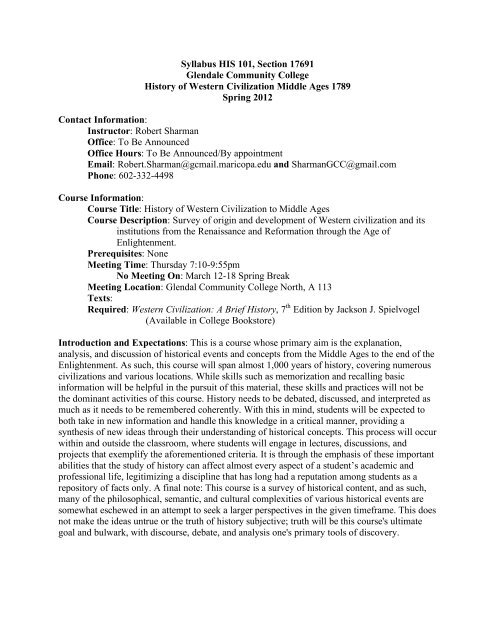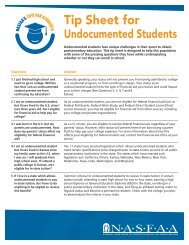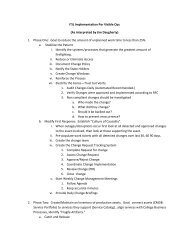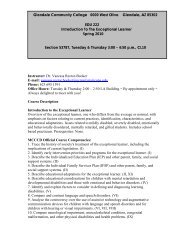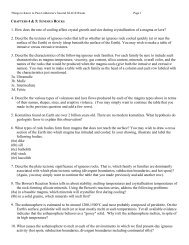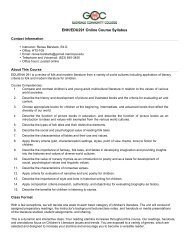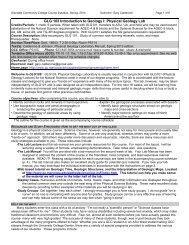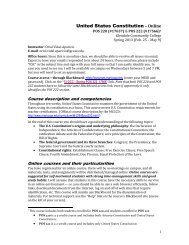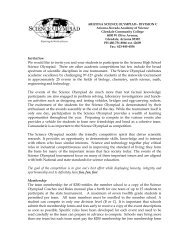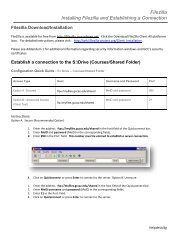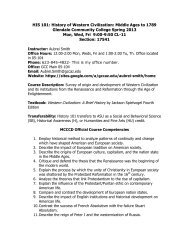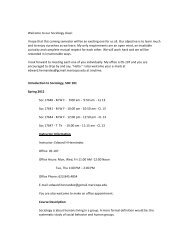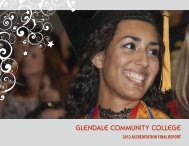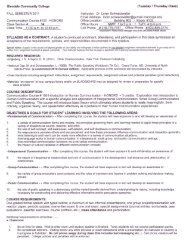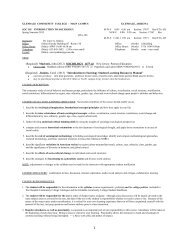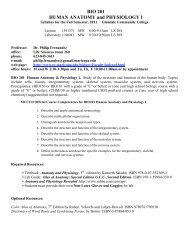Syllabus HIS 101, Section 17691 Glendale Community College ...
Syllabus HIS 101, Section 17691 Glendale Community College ...
Syllabus HIS 101, Section 17691 Glendale Community College ...
Create successful ePaper yourself
Turn your PDF publications into a flip-book with our unique Google optimized e-Paper software.
<strong>Syllabus</strong> <strong>HIS</strong> <strong>101</strong>, <strong>Section</strong> <strong>17691</strong><br />
<strong>Glendale</strong> <strong>Community</strong> <strong>College</strong><br />
History of Western Civilization Middle Ages 1789<br />
Spring 2012<br />
Contact Information:<br />
Instructor: Robert Sharman<br />
Office: To Be Announced<br />
Office Hours: To Be Announced/By appointment<br />
Email: Robert.Sharman@gcmail.maricopa.edu and SharmanGCC@gmail.com<br />
Phone: 602-332-4498<br />
Course Information:<br />
Course Title: History of Western Civilization to Middle Ages<br />
Course Description: Survey of origin and development of Western civilization and its<br />
institutions from the Renaissance and Reformation through the Age of<br />
Enlightenment.<br />
Prerequisites: None<br />
Meeting Time: Thursday 7:10-9:55pm<br />
No Meeting On: March 12-18 Spring Break<br />
Meeting Location: Glendal <strong>Community</strong> <strong>College</strong> North, A 113<br />
Texts:<br />
Required: Western Civilization: A Brief History, 7 th Edition by Jackson J. Spielvogel<br />
(Available in <strong>College</strong> Bookstore)<br />
Introduction and Expectations: This is a course whose primary aim is the explanation,<br />
analysis, and discussion of historical events and concepts from the Middle Ages to the end of the<br />
Enlightenment. As such, this course will span almost 1,000 years of history, covering numerous<br />
civilizations and various locations. While skills such as memorization and recalling basic<br />
information will be helpful in the pursuit of this material, these skills and practices will not be<br />
the dominant activities of this course. History needs to be debated, discussed, and interpreted as<br />
much as it needs to be remembered coherently. With this in mind, students will be expected to<br />
both take in new information and handle this knowledge in a critical manner, providing a<br />
synthesis of new ideas through their understanding of historical concepts. This process will occur<br />
within and outside the classroom, where students will engage in lectures, discussions, and<br />
projects that exemplify the aforementioned criteria. It is through the emphasis of these important<br />
abilities that the study of history can affect almost every aspect of a student’s academic and<br />
professional life, legitimizing a discipline that has long had a reputation among students as a<br />
repository of facts only. A final note: This course is a survey of historical content, and as such,<br />
many of the philosophical, semantic, and cultural complexities of various historical events are<br />
somewhat eschewed in an attempt to seek a larger perspectives in the given timeframe. This does<br />
not make the ideas untrue or the truth of history subjective; truth will be this course's ultimate<br />
goal and bulwark, with discourse, debate, and analysis one's primary tools of discovery.
Disabilities and Special Services: If you have a disability that may have some impact on your<br />
work in this class and for which you may require accommodations, you need to notify the<br />
Disability Services and Resources office, Location: TDS-100. Phone: 623-845-3080.<br />
Attendance Policy: Attendance is crucial for gaining a complete understanding of course<br />
materials. Missing a class removes a student from both the information provided during class and<br />
the relevant discussions attached to this information. As such, attendance is required for all<br />
classes, with 6 points awarded for each FULL class a student attends (to a maximum of 90<br />
points). However, I understand that work schedules and other life circumstances can impede<br />
attendance. There are a total of 16 days in the semester; as the total possible points for attendance<br />
is only 90, this means that a student is able to miss 1 days without incurring any point loss. This<br />
should not be taken to mean that students have 1 “free days.” Rather this should be seen as room<br />
for unexcused emergencies or other issues arising from the complications of human living.<br />
Further unexcused absences may result in the loss of points, and I reserve the right to drop<br />
students with excessive absences. Excused absences, as outline by GCC<br />
policy:(http://www.maricopa.edu/publicstewardship/governance/adminregs/students/2_3.php#att<br />
endance) will not incur a loss of points, though documentation will be required to prevent point<br />
loss. Finally, non-attendance does not automatically initiate a withdrawal, this must be student<br />
driven.<br />
Behavior Policy: As much of this course will be a combination of lectures and discussions,<br />
proper student behavior is necessary to smooth progress through the course material in a<br />
sufficient timeframe. Furthermore, it is important for all students to feel safe while expressing<br />
their views and interpretations. As such, students are expected to continually maintain a<br />
professional attitude and decorum. Students must switch all cell phones to off or silent, and<br />
students are prohibited from text messaging. If there is some situation that requires the need for<br />
an active cell phone, a student should notify the instructor prior to class. Finally, every student is<br />
expected to know and comply with all current published policies, rules and regulations as printed<br />
in the college catalog, class schedule, and/or student handbook.<br />
Blackboard: While this is not an online or hybrid class, this course will use blackboard for<br />
facilitation purposes. A copy of the syllabus, assignment directions, grading rubrics, and<br />
additional resources can all be found on Blackboard under their relevant headings. If you are<br />
unfamiliar with Blackboard there is an online orientation:<br />
http://www.maricopa.edu/blackboard/support/videos/student_overview.swf<br />
If you need further assistance, Blackboard tutorials can be found here:<br />
http://www.gccaz.edu/hd/tutorials/blackboard/<br />
Reading Assignments: Every unit of the course will have a reading assignment. These readings<br />
can be broken down so that they are generally not too long; however, they are required. It is<br />
highly recommended that students read in advance. This will allow students to more easily<br />
follow the weekly lectures and discussions. Reading assignments only require reading of the<br />
main text of your book. Picture captions and special sections within tan colored boxes are<br />
optional, unless otherwise noted, though highly recommended. Students should always strive to<br />
read the conclusion at the end of each chapter in the book. This section is often only a few<br />
2
sentences, but usually provides a quick summary of the chapter’s major points. Finally, many<br />
test questions will be derived from the reading material, so do not neglect the reading.<br />
Grading and Evaluations: This course is targeted at measuring individual student competency<br />
within the field of history. Thus, there will be no curve. Students will be evaluated with in-class<br />
unit quizzes and exams, which combine knowledge-based questions (multiple choice, true/false,<br />
or matching questions) with synthesis and analytical questions (short essay questions). There will<br />
be NO need for Scantron sheets or blue books. Tests and quizzes will be based on material found<br />
within the text, lectures, and class discussions. The last unit exam will act as the final exam, with<br />
very few cumulative (course-wide) questions. Furthermore, there will be 5 short essays (no more<br />
than 350 words) and two formal papers to be written outside of class and turned in on the dates<br />
specified in the course outline. When combined with Attendance and the <strong>Syllabus</strong>, these<br />
assignments make up the total number of points for the course, as outlined below:<br />
Attendance<br />
<strong>Syllabus</strong> Signature Sheet<br />
Discussion Essays (5 essays at 20 pts each)<br />
Quizzes (4 quizzes at 25 pts each)<br />
Formal Paper 1<br />
Formal Paper 2<br />
Unit Exams (5 exams at 100 pts each)<br />
Total Points Available<br />
90 pts<br />
10 pts<br />
100 pts<br />
100 pts<br />
100 pts<br />
100 pts<br />
500 pts<br />
1000 pts<br />
Your final grade will be determined on the following scale:<br />
900 to 1000 pts A<br />
800 to
Official Course Objectives:<br />
1. Employ historical method to analyze patterns of continuity and change which have<br />
shaped American and European society. (I-VII)<br />
2. Describe the impact of European tradition on American society. (I-VII)<br />
3. Describe the origins of European culture, capitalism, and the nation state in the Middle<br />
Ages. (I)<br />
4. Critique and defend the thesis that the Renaissance was the beginning of the modern<br />
world. (II)<br />
5. Explain the process by which the unity of Christianity in European society was shattered<br />
by the Protestant Reformation in the 16th century. (III)<br />
6. Analyze the theories that link Protestantism to the rise of capitalism. (III)<br />
7. Explain the influence of the Protestant/Puritan ethic on contemporary American life. (III)<br />
8. Compare and contrast the development of European nation states. (IV)<br />
9. Describe impact of English institutions and historical development on American life. (IV)<br />
10. Contrast the success of French Absolutism with the failure of Stuart Absolutism. (V)<br />
11. Describe the reign of Peter I and the westernization of Russia. (VI)<br />
12. Describe the stages of the scientific revolution and its impact upon the thought of the<br />
Enlightenment. (VII)<br />
Weekly Course Breakdown:<br />
Week Content and Competencies to be covered Assignments Due/Tests and Quizzes<br />
Unit 1 Reading: Readings Spielvogel Ch. 7 & 8<br />
Week<br />
1<br />
Week<br />
2<br />
Topics:<br />
Introduction: History and Civilization<br />
Define civilization & Middle Ages<br />
Death of Rome<br />
Germanic Invasions and Integrations<br />
Early German Kingdoms<br />
Ostrogothic Empire: First Medieval Kings<br />
Vandal, Visigoth, & Lombard Empires<br />
Merovingians & Early Carolingians<br />
Topics:<br />
Rise of Western Christianity (to early Carolingians)<br />
Early Christianity<br />
Late Roman Christianity<br />
Early Medieval Church<br />
Blended Institutions<br />
Law/Politics<br />
Church and State<br />
Society<br />
Rise and growth of Russia<br />
Administered 1/26/2012:<br />
Quiz 1<br />
Due 1/26/2012:<br />
<strong>Syllabus</strong> Signature Sheet<br />
Discussion Essay 1:<br />
What is History, and what is its<br />
purpose?<br />
4
Week<br />
3<br />
Week<br />
4<br />
Week<br />
5<br />
Week<br />
6<br />
Topics:<br />
Byzantine Empire<br />
Rome Continued<br />
Justinian<br />
Rise of Islam<br />
Early Rise<br />
Spread and Domination<br />
Cultural Renaissance<br />
Unit 2 Reading: Spielvogel Ch. 8, 9, & 10<br />
Topics:<br />
Early Middle Ages: Carolingian & Charlemagne<br />
Rise of Charlemagne, his empire and Successors<br />
Feudalism/Manorialism: The Feudal society<br />
Early ideals: Patron/client & Warlords<br />
Vassalage, Fiefdom, and Serfs<br />
Manorial System<br />
Church vs State: Christendom<br />
New Christian “ideal” state<br />
Topics:<br />
Last Barbarian Migrations:<br />
Vikings & Collapse of the Carolingians<br />
Magyars<br />
Norman Invasion<br />
High Middle Ages, Stabilization and Prosperity<br />
New Agriculture<br />
Aristocracy<br />
Intellectual pursuits<br />
University System: Scholasticism<br />
Roman Law and Classical Revival<br />
Topics:<br />
Nations and States (Kingdoms)<br />
England, France, Spain, & Holy Roman Empire<br />
Towns and Culture<br />
Trade, “Industry,” and Cities<br />
The Church’s new power and position<br />
Power of Middle Age Popes<br />
New Religious Orders<br />
Investiture Controversy<br />
The Crusades<br />
Crusades, Crusading mentality, & European Crusades<br />
Administered 2/2/2012:<br />
First Unit Exam<br />
Paper 1 Topic assignment<br />
Due 2/9/2012:<br />
Discussion Essay 2: Medieval monks<br />
used a form of history with many<br />
theological assumptions. How should<br />
historians and history handle the<br />
inherent biases of an era or a particular<br />
personal bias?<br />
Administered 2/16/2012:<br />
Quiz 2<br />
Due: 2/16/2012<br />
Paper 1: Rough Draft Due<br />
5
Week<br />
7<br />
Week<br />
8<br />
Week<br />
9<br />
Unit 3 Reading: Spielvogel, Ch. 11, 12, Oration on the<br />
Dignity of Man under Unit 3 resources on Blackboard<br />
Topics:<br />
Wars, famine, and Plague<br />
Climate Changes, loss of crops<br />
Hundred Years War<br />
Black Death<br />
Decline of the Church: Schisms<br />
Effects of plague<br />
West/East Schism<br />
Splits within West<br />
Wyclif, Hus, & the Avingnon Papacy<br />
Lorenzo Valla: Donation of Constantine<br />
Topics:<br />
Recovery and Rebirth: Renaissance: In Italy<br />
Plague to Renaissance<br />
Foreign influence<br />
Antiquarianism<br />
Cicero, Philology, Classics<br />
“History” rediscovered<br />
Examination of Humanism<br />
Mirandola: Oration on the Dignity of Man<br />
Printing presses<br />
Art and Expression<br />
Leon Battista Alberti: Painting & science<br />
Renaissance: Rest of Europe<br />
Renaissance as a human endeavor<br />
Need for human examples<br />
A movement of the mind and people<br />
Renaissance Mini-Biographies<br />
Petrarch, Leonardo Da Vinci, Michelangelo, Raphael,<br />
Lorenzo De Medici, Michavelli, & Erasmus<br />
Spring Break!!!<br />
Administered 3/1/2012:<br />
Second Unit Exam<br />
Paper 2: Assign Topics<br />
Due: 3/1/2012<br />
Formal Paper 1<br />
Paper Presentation (extra credit)<br />
Administered 3/8/2012:<br />
Third Unit Exam<br />
Due 3/8/2012:<br />
Discussion Essay 3: Just before the<br />
Renaissance, a new sense of source<br />
criticism arose, focusing on the ideas of<br />
accuracy and “truth.” How does one<br />
correctly interpret historical sources and<br />
“truth?”<br />
Work on Formal Paper 2, time will NOT<br />
be given in class.<br />
6
Week<br />
10<br />
Week<br />
11<br />
Week<br />
12<br />
Week<br />
13<br />
Unit 4 Reading: Spielvogel, Ch. 13, 14, 15<br />
Topics:<br />
Simultaneous complexities: Many happenings<br />
Reformation: Germany<br />
Catholic situations<br />
Luther & Zwingli<br />
Reformation: Rest of Europe<br />
Geneva: Calvin<br />
France: Civil War & Huguenots<br />
Topics:<br />
Counter-Reformation<br />
Ignatius Loyola: Jesuits<br />
Counter Reformation Popes<br />
Council of Trent<br />
Cultural issues<br />
Witchcraft, Peasants, Revolts<br />
Shakespeare<br />
Cuius regio, eius religio<br />
Peace of Augsburg<br />
England (Case Study)<br />
Thirty Years War<br />
Topics:<br />
New World Discovery<br />
Portugal, Spain, England<br />
“World” Empires<br />
Spain: Conquistadors<br />
Colonialism<br />
New trade: Mercantilism<br />
Unit 5 Reading: Spielvogel, Ch. 15, 16, 17, 18<br />
Topics:<br />
The wake of a new world and religious change<br />
Politics from changes<br />
Political Change: Absolutism, New Monarchy, & Democracy<br />
New Europe: The Early Modern Era<br />
Spain (decline), France & Germany<br />
England: Glorious revolution<br />
Russia: Peter the Great<br />
Administered 3/29/2012:<br />
Quiz 4<br />
Due: 3/29/2012<br />
Formal Paper 2, Era 1 topics only<br />
Paper Presentation (extra credit)<br />
Administered 4/5/2012:<br />
Fourth Unit Exam<br />
Due 4/5/2012:<br />
Formal Paper 2, Era 2 topics only<br />
Paper Presentation (extra credit)<br />
Due 4/12/2012:<br />
Paper Presentation (extra credit)<br />
Formal Paper 2, Era 3 topics only<br />
Due 4/12/2012:<br />
Discussion Essay 4: From 1400-1700,<br />
Europe underwent massive and<br />
simultaneous shifts. Explain how history<br />
can properly examine the complexity of<br />
these changes without simplifying their<br />
interconnectedness?<br />
7
Week<br />
14<br />
Week<br />
15<br />
Week<br />
16<br />
Finals<br />
Week<br />
Topics:<br />
Religion, and Science<br />
Religious position and backlashes<br />
Early Scientific and Philosophical Revolutions<br />
The heavens: Copernicus, Kepler, Galileo, & Newton<br />
Philosophy<br />
Descartes (rationalism) & Locke (empiricism)<br />
Method: Francis Bacon<br />
Old and future roles: Women<br />
Topics:<br />
The Enlightenment polity: Antecedents to the Enlightenment<br />
Science and Politics: Montesquieu<br />
Enlightenment Science<br />
Application of method: The "enlightened" man<br />
Enlightenment Philosophy & Religion<br />
Berkeley, Hume (skepticism), Rousseau, & Voltaire<br />
Deism<br />
Topics:<br />
Enlightened governance<br />
Modern Europe: States or Monarchies<br />
Developing institutions<br />
Enlightened war<br />
Seven Years War: Devastations of war<br />
Enlightened rebellion<br />
Intellectual dissent<br />
America's rebellion: Declaration of Independence<br />
French revolution<br />
Finals<br />
Administered 4/19/2012:<br />
Quiz 5<br />
Due 5/3/2012:<br />
Discussion Essay: How will new<br />
social media (for example: myspace,<br />
facebook, twitter) and the internet affect<br />
the future of the discipline of history?<br />
(No source citations required)<br />
Final Exam, 5/8/2012: Fifth Unit Exam<br />
Disclaimer: The instructor reserves the right to modify this syllabus<br />
in order to meet the needs of this class. Students will be notified by<br />
the instructor of any changes in course requirements or policies.<br />
8
<strong>Syllabus</strong> Acknowledgement and Agreement (10 pts, Due 1/26/2012)<br />
I, _____________________________________________________ (Print Student Name),<br />
acknowledge that I have read and understand the course syllabus for Spring 2012, History <strong>101</strong>,<br />
<strong>Section</strong> <strong>17691</strong>. By signing below I agree to follow the course requirements and policies,<br />
especially those regarding attendance, behavior, course reading, and grading.<br />
Student Signature:__________________________________________________<br />
Date:_________________________________________<br />
Disclaimer: The instructor reserves the right to modify this syllabus<br />
in order to meet the needs of this class. Students will be notified by<br />
the instructor of any changes in course requirements or policies.<br />
9


